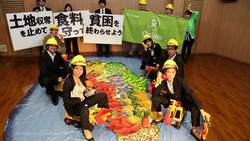World Bank | 11 October 2012 | français
The Reality About the Land Grab Issue and the World Bank Group
Today in Tokyo, on the side of our annual meetings where food security is a major issue being discussed, I had a few minutes to join Oxfam's session about land in developing countries.
I made the point that one of the best ways to help manage pressure on land is through the Bank Group's staying engaged in agriculture, working to build good practices and capacity in countries to manage investments better. As a result, we are saying no to Oxfam's call for a freeze on our work.
In fact we have ramped up our investments in agriculture in recent years, helping smallholders increase productivity, reduce waste, and get clear land tenure, and we want to do more. It was reassuring to hear from Oxfam directly that the Bank is not the primary target of their efforts. That's good because the vast majority of our agricultural investments help poor farmers grow food and involve no land purchase.
The World Bank invested over $5 billion in agriculture in developing and middle–income countries in the last financial year. Those funds helped smallholder farmers to provide irrigation and local communities to get access to their land rights. They also helped farmers get produce to market.
Of the $4.2 billion that the International Finance Corporation, the private sector arm of the World Bank Group, invested in agribusiness and forestry in the same period, just three investments – or 2 percent – had any component related to land acquisition. These investments are directed to improving food production and meet IFC performance standards, considered among the best in the world.
To feed 9 billion people by 2050 will require major new investment in agriculture. The World Bank Group is on the leading edge of this critical effort.
The World Bank works to improve land acquisition standards. Even Oxfam calls it the “world’s leading standard-setter.”
Freezing World Bank agricultural lending would target progressive governments and responsible investors who apply our high standards. That's why we disagree with Oxfam on this one. I look forward to our continued engagement with Oxfam where we do agree. But the best way to work on this issue is to stay engaged.













